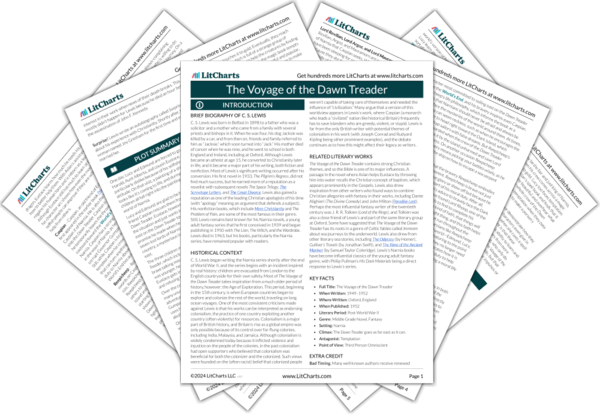Even the heroes of The Voyage of the Dawn Treader frequently face moments when they are tempted to do something that they know they shouldn’t. Caspian, for example, may be the fair and just king of Narnia, but even he is tempted when his crew comes across a magic lake that can turn anything to gold. Lucy too faces temptation when she opens up the Magician’s spell book and finds that it offers her the chance to become beautiful and overhear what her friends think of her. And the whole crew of the Dawn Treader (except Reepicheep) feels temptation when they pass by the Dark Island, which promises to make a person’s unfulfilled dreams into reality.
The temptations that these heroes face demonstrate how they are mortal and flawed. At times, these characters even give in to temptation (for example, as Lucy does when she casts a spell to spy on her friends). But what’s important is that these characters all learn from their mistakes. This ability to learn and change is what separates the heroic characters from more villainous figures like Governor Gumpas or Pug, who only do the right thing if someone forces them into it. The Voyage of the Dawn Treader suggests that temptation is inevitable, but that virtuous people either find ways to resist their poor impulses or learn how to become better through their mistakes.
Temptation ThemeTracker

Temptation Quotes in The Voyage of the Dawn Treader
There was not much difficulty in settling the matter once Eustace realized that everyone took the idea of a duel seriously and heard Caspian offering to lend him a sword, and Drinian and Edmund discussing whether he ought to be handicapped in some way to make up for his being so much bigger than Reepicheep. He apologized sulkily and went off with Lucy to have his hand bathed and bandaged and then went to his bunk. He was careful to lie on his side.
At this Gumpas began to pay real attention. “Oh, that’s quite out of the question,” he said. “It is an economic impossibility—er—your Majesty must be joking.”
He had turned into a dragon while he was asleep. Sleeping on a dragon’s hoard with greedy, dragonish thoughts in his heart, he had become a dragon himself.
“I will say the spell,” said Lucy. “I don’t care. I will.” She said I don’t care because she had a strong feeling that she mustn’t.
But when she looked back at the opening words of the spell, there in the middle of the writing, where she felt quite sure there had been no picture before, she found the great face of a lion, of The Lion, Aslan himself, staring into hers.
“Oh, Aslan,” said she, “it was kind of you to come.”
“I have been here all the time,” said he, “but you have just made me visible.”
“Fools!” said the man, stamping his foot with rage. “That is the sort of talk that brought me here, and I’d better have been drowned or never born. Do you hear what I say? This is where dreams—dreams, do you understand—come to life, come real. Not daydreams: dreams.”
“It’ll never do for the sailors to see all that,” said Drinian. “We’ll have men falling in love with a sea-woman, or falling in love with the under-sea country itself, and jumping overboard. I’ve heard of that kind of thing happening before in strange seas. It’s always unlucky to see these people.”
“Only two more things need to be told. One is that Caspian and his men all came safely back to Ramandu’s Island. And the three lords woke from their sleep. Caspian married Ramandu’s daughter and they all reached Narnia in the end, and she became a great queen and the mother and grandmother of great kings. The other is that back in our own world everyone soon started saying how Eustace had improved, and how “You’d never know him for the same boy”: everyone except Aunt Alberta, who said he had become very commonplace and tiresome and it must have been the influence of those Pevensie children.











